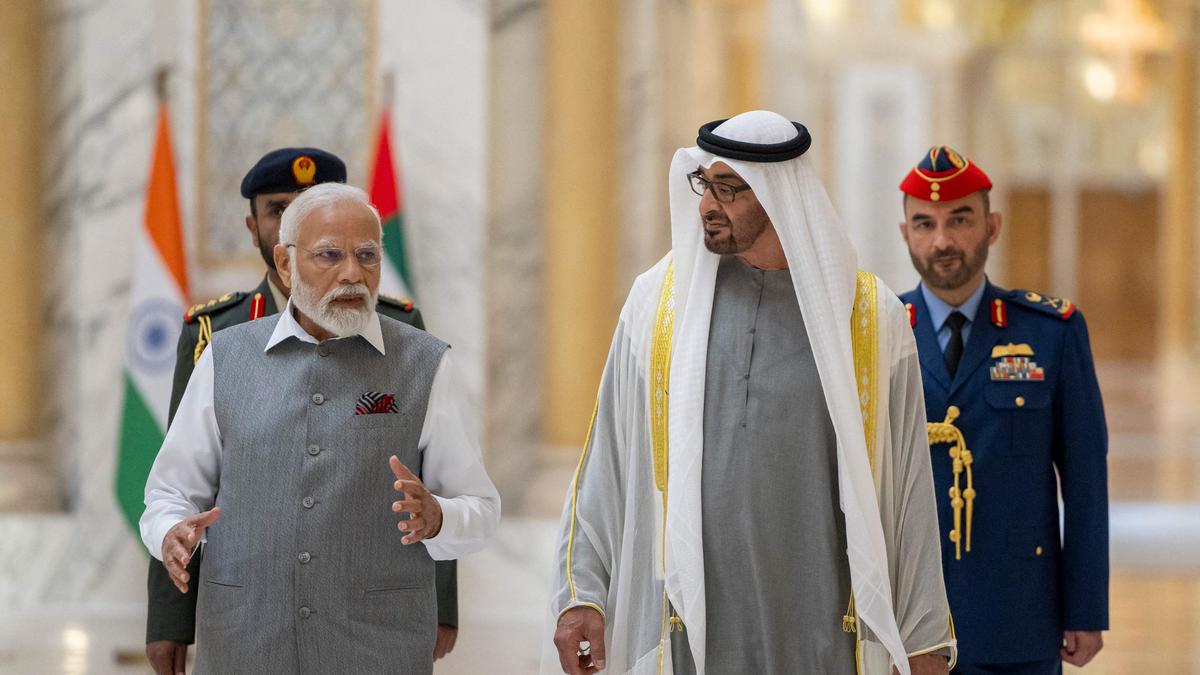
Explained | The India-UAE deal to trade with local currencies
The Hindu
RBI & UAE Central Bank sign MoUs to promote use of local currencies & interlink payment systems. This will help optimise transaction costs & settlement time for remittances, investments & trade. It will also facilitate mutual acceptance of domestic cards & UPI-IPP linkage for cross-border fund transfers.
The story so far: During Prime Minister Narendra Modi’s recent visit to the UAE, the Reserve Bank of India (RBI) and its Abu Dhabi-headquartered counterpart the Central Bank of the UAE signed two memoranda of understanding (MoUs). While the first established a framework to promote the use of local currencies for cross-border transactions, the other was for interlinking payment systems.
The first of the two MoUs aims to establish a Local Currency Settlement System (LCSS) to promote the use of rupee and the dirham bilaterally. It will cover all current and permitted capital account transactions. This, the RBI said, would enable exporters and importers to send invoices and pay in their respective domestic currencies, which in turn would help the development of the INR-AED foreign exchange market. It would also help promote investments and remittances between the two countries. Broadly, the arrangement would help optimise transaction costs and settlement time for transactions, including for remittances from Indians residing in UAE.
The focus on denominating export contracts and invoices in the local currency helps avert exchange-rate risks (such as when a third currency is being used as a standard), which further facilitates the scope to discover competitive pricing. Moreover, it could also lead to enhanced avenues for cooperation among the banking systems of the two countries, thereby contributing to the expansion of trade and economic activity for both. The major items of export from India to the UAE include mineral fuels, mineral oils and products, bituminous substances, mineral waxes, followed by pearls, precious stones and metals, electrical machineries and equipment, among other things. The major items imported by India are petroleum crude and petroleum related products. India-UAE trade rose to $85 billion in 2022. Furthermore, the UAE was India’s third largest trading partner and second-largest export destination in FY2022-23. Conversely, India was the UAE’s second largest trading partner.
Another important aspect about this economic relationship is that the UAE is the fourth largest investor in India. Its cumulative FDI inflows between April 2000 and September 2022 stood at around $15.2 billion.
The second of the two MoUs links India’s Unified Payments Interface (UPI) with its UAE-counterpart Instant Payment Platform (IPP). This is alongside the linking of card switches, that is, RuPay switch and UAESWITCH. Card switches entail facilitating communications and transactions between different payment service providers. The agreement would also explore linking of payment messaging systems of the two countries. The apex banking regulator in India said that the UPI-IPP linkage would enable users in either country to “make fast, convenient, safe, and cost-effective cross-border fund transfers”. As for card switches, the regulator stated, it will “facilitate mutual acceptance of domestic cards and processing of card transactions.” This is relevant to 3.5 million resident Indians living in the UAE (figure as of 2021).
One of the several issues with sending remittances back home, especially for low wage earners, is the high costs of transactions. This may entail fees and exchange rate margins, among other potential costs. In fact, the International Monetary Fund (IMF), in a larger context, had stated in a November 2022 report, “Because formal remittances involve high fixed costs and hence are expensive to provide, low-income individuals refrain from remitting, or are incentivised to use cheaper informal alternatives,” it stated. It is challenges like these that the UPI-IPP linkage would try to address in real-time.
The development follows up on similar endeavours undertaken in the recent past. In March, the National Payments Corporation of India (NPCI) finalised a collaboration with Singapore’s PayNow for facilitating cross-border real time money transfers. In fact, it was noted by officials at the Monetary Authority of Singapore (MAS) that facilitating remittances would become 10% cheaper.













